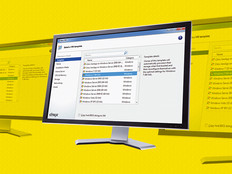What Is VMware Changing?
What's changed is that while Broadcom has committed to continue honoring perpetual licenses that customers purchased prior to the switch, it will no longer sell new perpetual licenses. Instead, it will offer annual subscriptions to VMware solutions.
The subscription fees will cover the cost of the solution, plus updates and support, and will (for the first time) also include access to vCenter, VMware’s server management software. The change raises questions about what might happen should a company stop paying the subscription fee: Would the solution simply stop working? Will organizations lose access to vCenter?
That could present a significant risk to organizations that are extensive users of VMware solutions within their data centers: If a company stops paying for the subscription, it might affect the whole data center.
RELATED: These small business solutions can help your organization.
What Are Businesses’ Data Center Management Alternatives?
Our own VMware customers have begun asking us about the implications of these changes, as well as some potential alternatives. Here’s what we can tell you:
Virtualization. Many organizations have come to rely on the kind of data center virtualization that VMware specializes in. For those looking to stick with that approach who are wondering about alternative virtualization software, Microsoft’s Hyper-V is the best option in many cases, as most businesses are already familiar with Microsoft operating systems and other solutions. A Windows Server Datacenter Edition license provides the purchaser with the option of creating an unlimited number of virtual machines.
Businesses that are experienced with Hyper-V and feel comfortable using it should consider this approach, because they can run just about any environment with the technology. As environments become larger and more complex, however, it’s hard to beat the ease of management that VMware delivers. Microsoft offers management solutions of its own that can simplify things for organizations running small and midsized data centers, but VMware excels at managing enterprise-size data centers with hundreds of VMs.
DIG DEEPER: Can serverless GPUs meet the computing demands of AI?
Hyperconverged infrastructure. For a more hardware-centric approach, hyperconverged infrastructure is a viable solution. In this case, Nutanix or Scale solutions are worth a look because they offer quick setup and simple management. The trade-off here is that Nutanix and Scale are HCI solutions, not virtualization software, so there are specific hardware requirements to support these solutions.
Linux-based operating systems. A final alternative is a switch to a Linux-based operating system, such as those produced by Red Hat and SUSE. These provide plenty of capability, but require more management from the user side, depending on what they’re trying to achieve. This is a great option for those who like to roll their sleeves up and mess with the open-source technologies.
Having said all that, it’s important to note that as of this writing, vSphere Standard, vSphere Foundations and vSphere Essentials Plus Kit all remain available from the company, and all include vSphere hypervisor and vCenter management tools. The VMware tools that businesses have long relied upon will continue to be available.
UP NEXT: Why artificial intelligence requires high-performance computing.
For now, at least, the big change seems to be the way the company will offer these solutions, as it more fully embraces a subscription pricing model. That’s why we recommend that businesses take a wait-and-see approach: There’s nothing wrong with considering your backup options, but it remains more likely than not that most VMware customers will decide that sticking with the tools they’ve long relied on is their smartest play.
For questions or a deeper conversation about your specific situation, please reach out to us.
This article is part of BizTech's AgilITy blog series.












